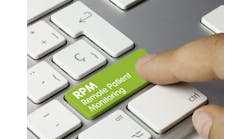To help cope with a worsening flu and RSV season, as well as COVID, OSF OnCall, the digital care platform of Illinois-based OSF HealthCare, has launched a no-cost, at-home support program for RSV.
The collaborative effort with OSF clinical outpatient and hospital leaders will not only provide comfort and supportive care for patients and parents, it can also keep infants and toddlers out of the hospital. The remote patient monitoring (RPM) program is also in response to a state public health alert about a growing lack of pediatric ICU beds due to RSV.
RSV is the No. 1 reason for hospitalization of children under age 1 in the United States. It can lead to bronchiolitis (inflammation of the small airways in the lung) and pneumonia (infection of the lungs), especially in babies.
However, Mary Stapel, M.D., lead physician for Community Care for OSF HealthCare Saint Francis Medical Center said RSV can often be managed at home.
“For the more common cold type symptoms, we can recommend the conservative treatments at home nasal saline with some suctioning, a cool mist humidifier you know, just kind of frequent, small feedings to optimize keeping that child hydrated,” Stapel said in a statement.
Clinical Digital Care Supervisor Rose Smith, M.S.N., B.S.N., R.N., said OSF OnCall was able to implement its 24/7 digitally enabled, at-home monitoring program for RSV quickly, because of its experience with similar efforts to help patients with chronic conditions such as diabetes and heart failure. In the first week of the RSV support program, more than 70 parents and caregivers have enrolled newborns and children up to age 5.
Smith said parents and caregivers love having support anytime in the day, however they want to do it – text message, phone call, anything. “They can send us pictures. We've really kind of taken that to tailor what parents need to feel comfortable taking their children home, you know, from a clinic; from the hospital during the scary time with RSV.”
OSF OnCall providers and at-home caregivers use a software application that provides education or prompts to report relevant signs/symptoms over 10 days. Smith said that upon enrollment, parents receive a care kit for at-home use from their provider following a visit or a digital community health worker can deliver one.
“We have a pulse oximeter to monitor oxygen levels and their heart rate and then we have a thermometer and then we also provide saline spray, and then a bulb syringe,” she added. “A lot of parents, when their babies are born, they use them in the hospital, but they might not know that they can use them to help relieve any secretions especially before feeding their children.”
Parents who have a child in the program can request a video visit at any time. The nursing staff will also recommend a video visit if needed.
The OnCall RSV RPM program is for anyone in Illinois or Michigan. Patients must have a positive RSV test or an RSV diagnosis to qualify. Referrals can be made by providers in a hospital emergency department, OSF OnCall Urgent Care, OSF PromptCare, medical offices, or following hospital discharge.
Respiratory-related complaints made up half of all hospital emergency department visits at OSF in November, totaling 9,383 patients. Nearly 40 percent of those were infants and children.
At OSF HealthCare and across the country, there is concern that indoor holiday gatherings could accelerate the transmission of RSV, the flu and COVID-19, spreading hospitals and their staff thin. Some pediatric groups have been urging the federal government to declare a public health emergency in response to the surge in RSV and other respiratory illnesses.
Stapel said the three viruses have already impacted staffing across the country. “It's not only a hard time with staffing already, but you add the holidays, you add illness, and so I think it's going to be a challenge and I think we're already doing this here, but I think preparing for what that surge, ongoing surge with staffing, and what surge capacity looks like … it's an important thing for every institution.”


